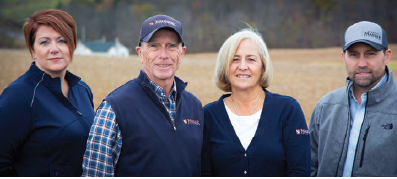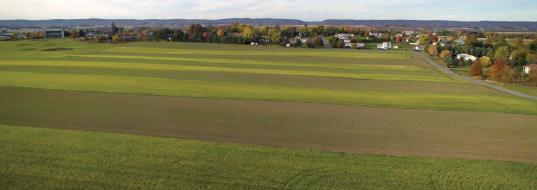March 1, 2017
The American Soybean Association (ASA) congratulates the regional winners of the 2016 Conservation Legacy Awards.
Keith Masser, Sacramento, Pa. (Northeast Region)
Each winner will be recognized at the ASA Awards Banquet on March 3, 2017, at Commodity Classic in San Antonio, Texas. During the banquet, one of the farmers will be chosen as the national winner.
Check out Keith Masser's story.
Sustainability requires a farmer to take the long view. In the case of the Masser family, that’s a really long view, indeed.
The story of this multigenerational Pennsylvania farm family begins in 1754, when Mathias Masser and his wife, Barbara, left Wurttemberg, Germany, for the New World. By 1800, their son, Johannes, had ventured into western Schuylkill County, where he grew fruit and vegetable crops, primarily potatoes.
Fast-forward a couple of centuries, and you will find Keith Masser at his desk in Sacramento, PA, in the Hegins- Lykens Valley of Schuylkill County, the seventh generation of the Masser family to farm Pennsylvania soil. The family continues to be known for its potatoes, corn, soybeans, wheat, hay, and a variety of other crops, including many types of cover crops.
The family operation is known as Sterman Masser Inc. — named for Keith’s father — and it is the East Coast’s largest potato grower, packer, processor, and shipper, handling more than 300 million pounds of potatoes a year. In addition to growing 1,000 acres of potatoes, farming operations include 2,500 acres of corn and 1,000 acres of soybeans. Approximately 5,000 total acres are devoted to crops.

There are grandchildren, so Keith is thinking ahead to a possible ninth generation. “We are grooming future generations of farmers,” he says. “We are passionate about taking pride in our land, and conserving water and soil. It is important that we have the resources available for future generations to continue to build the business that my ancestors started.”

Follow the contour
Protecting resources at Sterman Masser Inc. begins with the most basic asset of any farm: the soil. Farming in this Appalachian region requires working a lot of side slopes. That’s why you’ll find a web of contour strips extending across the company’s land, more than 1,300 skeins of 120-foot-wide fields weaving a mosaic of crop production.
“Contour strips are one of the ways we respond to the challenges we face when farming in this area,” Keith says. The main soil series is a highly fertile Leck Kill silt loam, formed from red shale.

“The topsoil is 8 to 10 inches deep, but it has to be kept in place so we can grow crops with it,” Keith says. “Farming in contour strips protects the soil, but it presents a number of issues. The strips are 120 feet wide and not all straight. Our average strip encompasses only about 2.5 acres, which creates a challenge when you try to use larger equipment to achieve economies of scale.”
The side slopes and narrow strips also challenge GPS-guided equipment, especially with trailed implements. But GPS has been a valuable technology; steering features added to some of the trailing implements keep them on track, and devices such as automatic shutoffs on row units add efficiency to corn planted in the irregular fields. “We are fortunate to have GPS helping things work for us,” Keith adds. “It helps make us competitive with those folks west of here who farm large, flat fields.”
The Masser family also protects soil and builds soil health through practices such as no-till, crop rotation, and cover crops. “Corn and soybeans as well as our small grains are all no-till,” Keith points out. “The only time we use tillage is ahead of potatoes.” The farm uses four main crop rotations: potatoes-wheat have corn; potatoes-wheat-timothy; potatoes alfalfa- alfalfa; or corn-corn-soybeans.
A cover crop typically follows the cash crop; the farm grows its own rye and oats as well as some barley that are used for cover-crop acres. The operation is experimenting with a new cover crop intended to follow behind potatoes.
It is a high-erucic-acid rapeseed (HEAR) which contains more than 50% erucic acid, a source of renewable stock for plastics. The seed, crop, and oil all look similar to canola, and it is grown exactly the same as that crop. The HEAR will grow over the winter months and be harvested and sold as an oil crop.
Track record
Innovation has long been a part of the family’s efforts to protect resources.
Sterman Masser Inc. is the majority shareholder in Keystone Potato Products (KPP), based in Hegins, PA.
This is the East Coast’s only dehydration plant for converting off-grade potatoes into potato flakes and flour.
KPP uses methane gas from a neighboring waste disposal site to produce steam used in dehydrating, cooking, peeling, and wash-down of the facility. A state-of-the-art treatment process removes iron and manganese from water taken from abandoned anthracite mines for use in the plant.
Three million gallons a month of this filtered water returns to the Swatara Creek watershed, helping to restore an environment affected by acid mine drainage. This water treatment facility was established in partnership with the Schuylkill County Conservation District.
Protecting the water resource has high priority in all the company’s farming operations. “We irrigate about 40% of our acreage,” Keith says. “We have mostly center pivots, although we do have some solid-set irrigation. Our primary source for water is surface water. We have irrigation holding ponds, and we also irrigate using water from streams.” New center-pivot installations use GPS for precision application.
The farm also protects the nearby mountain streams by adding buffers, waterways, and filter strips as needed on individual fields.
There’s even more. The farm’s comprehensive integrated pest management (IPM) program earned the National Potato Council / Environmental Protection Agency Environmental Stewardship Award in 1998. And Sterman Masser Inc. installed one of the largest solar energy systems in Pennsylvania, with the 1-MW system going on line in 2011. The panels on this 8-acre site produce more than 90,000 kilowatt-hours of electricity each month, offsetting about 40% of the power needed for such things as the farm’s grain handling and potato packing facilities.
There’s also an emphasis on aesthetics, both on land the family owns as well as the land they rent. “We pride ourselves in keeping our farms manicured,” Keith says. “We have a crew that keeps mowers running all summer long. We pride ourselves on having our landlords understand that we take care of their land the way we take care of our own. We keep the waterways and headlands mowed, which keeps the weeds down, and makes the farm more attractive and more usable. It also lets others know that we take pride in our business.”
Keith Masser says he wants to set a course that allows the family business to make a difference in the world for generations to come. “In the next 40 years we have to feed twice as many people as we currently are feeding while our land base is going to remain unchanged,” he says. “We have to get more productive with the resources that we currently have in order to feed the people of the world.”
You May Also Like




